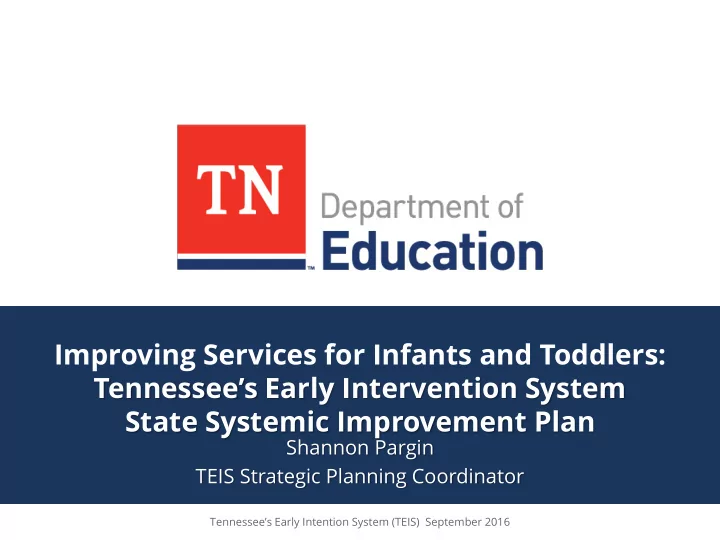

Improving Services for Infants and Toddlers: Tennessee’s Early Intervention System State Systemic Improvement Plan Shannon Pargin TEIS Strategic Planning Coordinator Tennessee’s Early Intention System (TEIS) September 2016
TEIS Overview Tennessee’s Early Intervention System (TEIS) is an educational program for families with children age birth to three with disabilities or developmental delays. TEIS provides services as outlined in the Individuals with Disabilities Education Act (IDEA)
TEIS Eligibility • Children diagnosed with certain disabilities – Diagnosed condition list is available on the TEIS website: www.tn.gov/education/teis • Children who show a 25% delay in two developmental areas: motor, communication, cognition, social, and adaptive, or • Children with a 40% delay in one area • Eligibility determined through multi-disciplinary approach, including a review of medical records
State Systemic Improvement Plan
Compliance vs. Results A focus solely on compliance has not lead to improved outcomes for infants and toddlers and their families The State Systemic Improvement Plan is focused on results at the child level 5
Plan Development & Implementation (2014-2020)
Root Causes of Low Performance • Factors limiting family engagement in early intervention • ECO measurement/data • Screening/eligibility processes • Service coordinator caseloads
Impact of Low Socioeconomic Status on TEIS Children • Referral less likely to result in an IFSP • Average length of time in services is lower • Less likely to exit TEIS at the level of same age peers
. . . Implement improved . . . Are engaged Improves procedures for procedures so fewer sooner, allowing them screening and evaluating children are found initially to have increased potentially eligible ineligible and later time participating in infants/toddlers . . . identified as eligible early intervention Establishes clear expectations . . . Have well-functioning . . . Are understanding for the role of the IFSP team IFSP teams that are more of, focused on and and the contributions of its coordinated in their supported in their members, including families, implementation of early efforts to maximize in achieving child outcomes . . intervention services, their child’s . targeting acquisition of development knowledge and skill development Evaluates program quality and . . . Are active and . . . Implement quality increases early intervention knowledgeable family centered early provider competence and participants in intervention confidence to implement family supporting their child’s statewide centered early intervention, which development includes services based on child and family needs, routines, and natural environments . . . . . . Consistently value, Implements measures to . . . Are involved in the collect and use ECO improve processes for ECO process and data as a measure of accurate data collection and supported in their dissemination to increase program and child efforts to maximize providers’ overall performance their child’s success understanding of ECO data . . . 2/29/16
For More Information www.tn/gov/education/teis
Contact Us Shannon Pargin, LMSW Strategic Planning Coordinator TN Early Intervention System (615) 253-4308 Shannon.Pargin@tn.gov
Recommend
More recommend